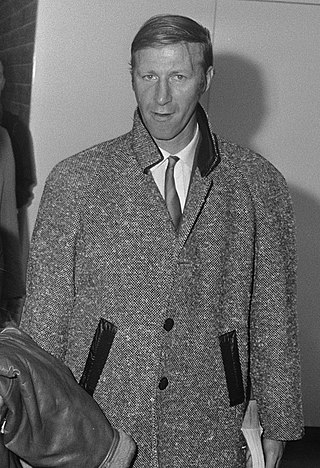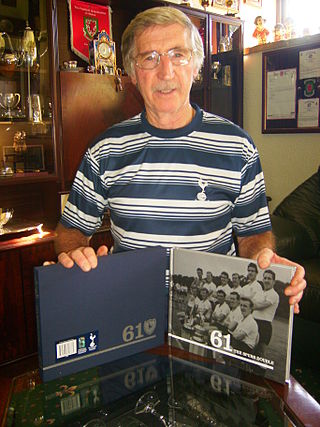
Sir Robert Charlton was an English professional footballer who played as an attacking-midfielder, left-winger or centre-forward. Widely considered one of the greatest players of all time, he was a member of the England team that won the 1966 FIFA World Cup, the year he also won the Ballon d'Or. He finished second in the Ballon d'Or voting in 1967 and 1968. He played almost all of his club football at Manchester United, where he became renowned for his attacking instincts, passing abilities from midfield, ferocious long-range shooting from both left and right foot, fitness, and stamina. He was cautioned only twice in his career; once against Argentina in the 1966 World Cup, and once in a league match against Chelsea. With success at club and international level, he was one of nine players to have won the FIFA World Cup, the European Cup and the Ballon d'Or. His elder brother Jack, who was also in the World Cup–winning team, was a former defender for Leeds United and also for ten years was the manager of the Republic of Ireland.

Sir Geoffrey Charles Hurst is an English former professional footballer. A striker, he became the first player to score a hat-trick in a World Cup final, as England recorded a 4–2 victory over West Germany at Wembley in 1966. With the death of Sir Bobby Charlton in October 2023, Hurst became the last living player from the team that won the 1966 final.

The 1966 FIFA World Cup final was a football match played at Wembley Stadium in London on 30 July 1966 to determine the winner of the 1966 FIFA World Cup, the eighth FIFA World Cup. The match was contested by England and West Germany, with England winning 4–2 after extra time to claim the Jules Rimet Trophy. It was the first – and to date only – occasion that England has hosted or won the World Cup.

Jack Charlton was an English professional footballer and manager who played as a centre-back. He was part of the England national team that won the 1966 World Cup and managed the Republic of Ireland national team from 1986 to 1996, taking them to two World Cups and one European Championship. He was the elder brother of Manchester United forward Bobby Charlton and one of his teammates in England's World Cup final victory.

James Peter Greaves was an English professional footballer who played as a forward. Regarded as one of the greatest strikers of all time and one of England's best ever players, he is England's fifth-highest international goalscorer with 44 goals, which includes an English record of six hat-tricks, and is Tottenham Hotspur's second-highest all-time top goalscorer. Greaves is the highest goalscorer in the history of English top-flight football with 357 goals. He finished as the First Division's top scorer in six seasons, more times than any other player and came third in the 1963 Ballon d'Or rankings. He is also a member of the English Football Hall of Fame.

George Best was a Northern Irish professional footballer who played as a winger, spending most of his club career at Manchester United. A skillful dribbler, he is considered one of the greatest players of all time, along with being considered one of the most talented to play. He was named European Footballer of the Year in 1968 and came fifth in the FIFA Player of the Century vote. Best received plaudits for his playing style, which combined pace, skill, balance, feints, goalscoring and the ability to get past defenders. His style of play captured the public's imagination, and in 1999 he was on the six-man short-list for the BBC's Sports Personality of the Century. He was an inaugural inductee into the English Football Hall of Fame in 2002.

Colin Bell was an English professional footballer who played as a midfielder. Bell, known for his thirteen-year spell at Manchester City, is regarded as one of the club's greatest-ever players, and was part of the Bell–Lee–Summerbee trio in the late 1960s and 1970s. Bell made 48 appearances for the England national football team; he was an unused squad member at UEFA Euro 1968 and played in three matches at the 1970 FIFA World Cup.

Norbert Peter Stiles was an English footballer and manager. He played for England for five years, winning 28 caps and scoring one goal. He played every minute of England's victorious 1966 FIFA World Cup campaign. In the semi-final of that tournament against Portugal, he was given the job of marking the prolific Eusébio. His tough performance resulted in Eusébio being practically nullified for the entire game. Stiles also played in the final, which England won 4–2 against West Germany. His post-match dance on the Wembley pitch, holding the World Cup trophy in one hand and his false teeth in the other, was widely broadcast.

William Anthony Foulkes was an English footballer who played for Manchester United in the Busby Babes teams of the 1950s, and also in the 1960s. His favoured position was centre-half. For Manchester United, he played 688 games which places him at number 4 on the all-time list of appearances behind Ryan Giggs, Bobby Charlton and Paul Scholes. He made 3 appearances as a substitute. He also started in every single United game in the 1957–58, 1959–60 and 1964–65 seasons. He scored a total of 9 goals in his 18 seasons at United and helped the club win four First Division titles, one FA Cup and one European Cup. He was capped three times for England in 1954–55.
The history of the England national football team, also known as the Three Lions, begins with the first representative international match in 1870 and the first officially-recognised match two years later. England primarily competed in the British Home Championship over the following decades. Although the FA had joined the international governing body of association football FIFA in 1906, the relationship with the British associations was fraught. In 1928, the British nations withdrew from FIFA, in a dispute over payments to amateur players. This meant that England did not enter the first three World Cups.
Geoffrey Green OBE was an English football writer. Geoffrey Green was educated at Shrewsbury School, where he played football. He started writing about football for The Times in the 1930s. He is considered to be the godfather of football reporting, although he remained anonymous in the paper until 23 January 1967. He also broadcast on football for BBC Radio.
The 1968–69 season was the 89th season of competitive football in England.

Ronald Flowers was an English professional footballer, who played as a midfielder, and was most known for his time at Wolverhampton Wanderers. He was a member of England's victorious 1966 World Cup squad. He was the elder brother of John Flowers.
The 1957–58 season was the 78th season of competitive football in England.
The 1965–66 season was the 86th season of competitive football in England.
William John Irvine is a Northern Irish former professional footballer who played as a centre forward. Born in Eden, County Antrim, into a large family, he grew up in the nearby town of Carrickfergus. He did well at school, but chose to pursue a career in professional football and initially played for local club Linfield. After a spell in amateur football, Irvine travelled to England for a trial with Burnley at the age of 16. He was offered a professional deal and spent three years playing for the youth and reserve teams, before making his senior debut at the end of the 1962–63 season. Over the following seasons, Irvine became a regular feature of the Burnley team and in the 1965–66 campaign, he scored 29 goals and was the highest goalscorer in the Football League First Division.

Clifford William Jones is a Welsh former footballer. During his career, he played as a winger and was a crucial member of Tottenham Hotspur's 1960–61 double-winning side. He is now the last surviving player from the Welsh team in the 1958 World Cup.

The 1968 European Cup final was the final match of the 1967–68 European Cup, the premier club football competition in Europe. It was played at Wembley Stadium in London, England, on 29 May 1968 between Benfica of Portugal and Manchester United of England in front of a crowd of 92,225. Both teams had to go through four rounds of two-legged knockout ties to reach the final; it was Benfica's fifth European Cup final, two of which they had won, and Manchester United's first.
Liam Tuohy was an Irish footballer and manager. During the 1950s and 1960s, Tuohy played as an outside left for Shamrock Rovers, Newcastle United, and the Republic of Ireland. In 1959, while playing for Ireland, Tuohy scored the first ever goal in the history of the European Championship. After retiring as a player, Tuohy became a coach and managed several clubs in the League of Ireland including Shamrock Rovers, Dundalk, and Shelbourne.

Robert Frederick Chelsea Moore was an English professional footballer. He captained West Ham United for more than ten years, and was the captain of the England national team that won the 1966 FIFA World Cup. He is widely regarded as one of the greatest defenders in the history of football, and was cited by Pelé as the greatest defender he had ever played against. Moore is sometimes considered to be one of the greatest players of all time.














